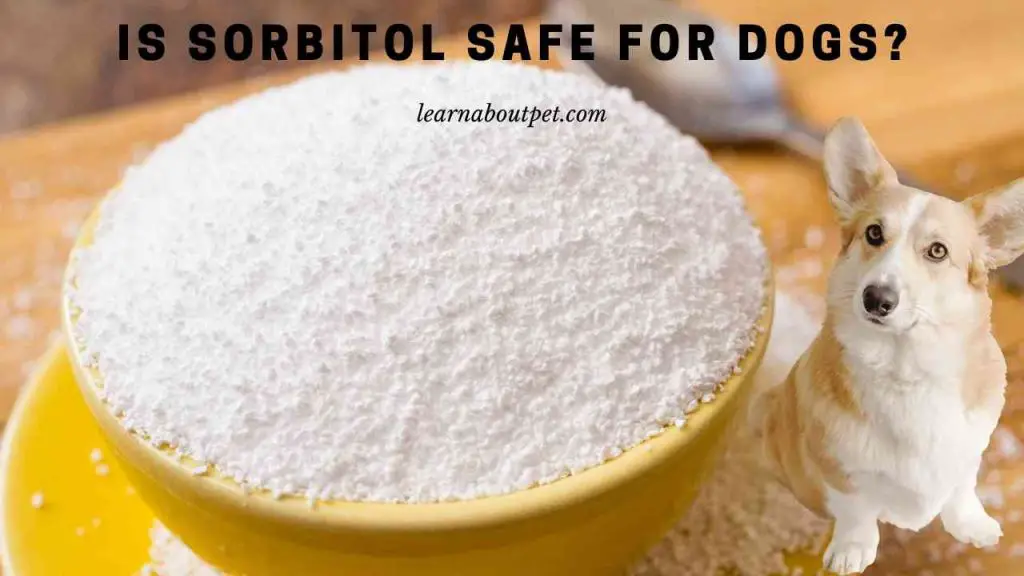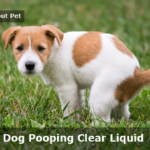One of the questions that dog owners tend to pose often is as to whether sorbitol is safe for dogs. In this article, you will find a comprehensive answer to this question.
Is sorbitol safe for dogs? The answer is yes, sorbitol is safe for dogs. As long as they have it in moderate amounts. But if dogs have too much sorbitol, they may experience stomach upsets and diarrhea. Too much sorbitol may also worsen the symptoms of Irritable Bowel Syndrome (IBS).
Most of the sorbitol dogs get to ingest is that which is an ingredient in products such as dog toothpastes and dog foods.
Generally, for dogs sorbitol is safe: unless the dogs happen to take too much of it.
What may really potentially make sorbitol bad for dogs is if they happen to be allergic to it.

Another scenario where sorbitol and dogs may have problems is where the dogs happen to have Irritable Bowel Syndrome (IBS). In that case, sorbitol may worsen the IBS symptoms.
Sorbitol for dogs that are either pregnant or lactating may also be problematic. That is because it has potential to reach the gestating or nursing puppies, sometimes causing quite serious ill effects.
On the whole though, if you were wondering, is sorbitol ok for dogs, then the answer is ‘yes’ – as long as they have it in moderation.
But before going any further in our exploration of the is sorbitol safe for dogs question, it is important for us to first have some basic understanding of what exactly the sorbitol in question is.
What Is Sorbitol?
It would be improper for us to go deeper in answering the “is sorbitol safe for dogs” question without having insight on what exactly the sorbitol in question is.
As it turns out, sorbitol is a sugar substitute: meaning that it is a substance which takes the place of sugar in various products.
In chemical terms, it is a sugar alcohol. The people who make it produce it using potato starch. Or they extract it directly from fruits such as peaches, prunes as well as apples. Therefore it is natural.
What makes it different from ordinary glucose is the extra hydrogen atom it has.
In our context, where we are trying to answer the is sorbitol safe for dogs question, it is important to point out that it is a common ingredient in certain dog foods and dog toothpastes.
Therefore instead of adding actual sugar to a dog toothpaste, the manufacturers may add sorbitol. Similarly, rather than adding actual sugar to a dog treat food, the makers may use sorbitol instead.
With this basic insight on sorbitol, we can now proceed to answer the is sorbitol safe for dogs, can dogs eat sorbitol and other related questions.
But before doing so, we first need to establish whether sorbitol is same as xylitol.
Is Sorbitol Same As Xylitol?
Most of the people who pose the is sorbitol safe for dogs question will often also express an interest in knowing whether it is same as xylitol.
So, indeed, is xylitol same as sorbitol? Or, to be more specific, is sorbitol same as xylitol for dogs?
The truth of the matter is that sorbitol is not exactly the same as xylitol.
Here is where the key difference between the two lies: making sorbitol entails adding an extra hydrogen atom to glucose. On the other hand, making xylitol entails adding an extra hydrogen atom to xylose.
Our focus here, however, is on their respective effects on dogs. Therefore what is necessary is a sorbitol vs. xylitol in dogs comparison.
What you come to learn is that sorbitol is largely safe for dogs: unless they have too much of it. On the other hand, xylitol is harmful to dogs, even at fairly low quantities.
That is what a xylitol vs sorbitol dogs comparison reveals.
Suppose, for instance, you pose the can dogs have sorbitol and the can dogs have xylitol questions.
With regard to sorbitol, you will be told that dogs can have it, as long as it is in moderation. But with regard to xylitol, you will learn that dogs shouldn’t have it: as it can be very harmful to them, even at low quantities.
Thus sorbitol dogs side effects only manifest when dogs have it in excess. But xylitol dogs side effects may manifest even at low quantities.
The bottom line: is sorbitol the same as xylitol for dogs. The answer is ‘no’. They are different. And for dogs sorbitol is generally better than xylitol.
With this background information, we can now proceed to answer the is sorbitol safe for dogs question more deeply.
Is Sorbitol Safe For Dogs?
In answering the is sorbitol safe for dogs question, there are two considerations we need to make.
The first consideration we need to make, in answering the is sorbitol safe for dogs question, is that of what the sorbitol is made from, and how it is made.
And the second consideration we need to make, in answering the is sorbitol safe for dogs question, is that of what tends to happen when dogs ingest sorbitol.
Let’s start with what sorbitol is made from (and how it is made). It turns out that sorbitol is usually made from either potato starch or directly extracted from fruits such as apples, peaches and prunes.
None of these things from which sorbitol comes is patently toxic to dogs. Consequently, the answer to the is sorbitol toxic for dogs question is ‘no’.
What tends to happen when dogs ingest sorbitol? In most cases, nothing happens. Dogs regularly have their teeth brushed using toothpastes containing sorbitol, with no ill effects.
Dogs also often eat various treats containing sorbitol as a sweetener, again with no ill effects.
If you research on is sorbitol toxic to dogs, you will find that the answer is mostly ‘no’. The same is the case, when you research on the is sorbitol bad for dogs question.
By the way, sorbitol often goes together with sucralose and mannitol. And when you research on questions like is sucralose safe for dogs or is mannitol safe for dogs, you find that the answer is still mostly ‘yes’.
Usually, the worst that may happen when a dog has lots of sorbitol is an upset stomach. That usually manifest through some diarrhea, bloating, flatulence and so on. It is usually self-resolving.
All in all though, sorbitol – in moderation – is safe for dogs.
Is Sorbitol Safe For Dogs In Toothpaste?
Much of the sorbitol dogs get to ingest is that which is in dog toothpastes.
Therefore in answering the is sorbitol safe for dogs question, we need to focus a bit on the toothpastes.
For instance, in an enzymatic toothpaste for dogs, you may often find sorbitol included as a sweetener.
And this often gets dog owners worrying – to the point of asking, is sorbitol safe for dogs when it is included in toothpastes? Or, more generally, is sorbitol safe for pets when it is part of pet toothpastes?
The truth of the matter is that sorbitol is safe for dogs, when it is an ingredient in dog toothpastes.
In chemical terms, there is nothing in the sorbitol we find in dog toothpastes that should be worrisome for dog owners.
And experience shows that dogs which use the toothpastes containing sorbitol normally suffer no harm.
Even when dogs accidentally ingest too much of such toothpastes, the worst they may suffer are minor stomach upsets. And these are not always due to the sorbitol, but also due to the other ingredients in the toothpastes.
The sorbitol in dog toothpastes is too little to be worth worrying about.
All in all, the sorbitol in dog toothpastes is safe.
If you were to research on what sweetener is toxic to dogs, sorbitol usually won’t be in the list.
Thus, if a dog toothpaste happens to list sorbitol as an ingredient, you can purchase it for your dog without worrying too much about its safety. That is unless the dog happens to have an obvious sorbitol allergy.

Is Sorbitol Safe For Dogs In Foods?
Some dog foods list sorbitol as one of the ingredients.
Therefore in answering the is sorbitol safe for dogs question, we have to consider this angle: where the sorbitol is present as an ingredient in dog foods.
For instance, is the sorbitol in dog treats safe?
By the way, some of these treats are meant for use by both cats and dogs. Therefore the question becomes, is sorbitol safe for dogs and cats (when it is in pet treats)?
The truth of the matter is that the sorbitol in dog foods is largely safe.
Dogs routinely eat foods containing sorbitol without suffering any ill effects.
Moreover, the sorbitol comes from natural sources, such as potato starch, apples, prunes and peaches.
There is therefore really no basis for sorbitol dogs toxic fears.
Indeed, even if you were to ask, is sorbitol safe for cats – the answer would largely be along the same lines. That it is safe, as long as they have moderate amounts of it.
The amount of sorbitol in a dog treat will normally be so little that it can’t cause any ill effects.
And even if any ill effects were to be observed, those would largely be things like minor stomach upsets.
But when you ask, is sorbitol poisonous to dogs, the answer tends to be a categorical ‘no’. That is unless the dogs have too much of it: which they are unlikely to get in most dog foods.
Thus, if you happen to find a dog food listing sorbitol as the sweetener in it, you may buy it with confidence. This would be confidence from the fact that the safety profile of sorbitol for dogs is reasonably good.
Is Sorbitol Safe For Diabetic Dogs?
Sorbitol is largely safe for diabetic dogs.
What makes sorbitol safe for dogs that have diabetes? It is the fact that sorbitol cannot be broken down into the sorts of sugars that can cause spikes in the bloodstream.
That is what makes sorbitol safe for dogs that have diabetes.
This, by the way, is still the answer you would get to the is sorbitol safe for cats that have diabetes question.
Ultimately, if you were wondering, is sorbitol safe for diabetic dogs, now you know that the answer is ‘yes’.
Will Sorbitol Hurt Dogs?
Another way of posing the is sorbitol safe for dogs question is this: where people seek to establish whether sorbitol can hurt the dogs.
The truth of the matter is that sorbitol is unlikely to hurt dogs.
Sorbitol is usually made from potato starch. Or it is directly extracted from fruits like apples, peaches and prunes, where it occurs naturally. It is really not the sort of substance that can hurt dogs, unlike xylitol.
Of course, if dogs have too much sorbitol, there may be slight problems. But those are usually things like stomach upsets, and diarrhea (from sorbitol’s laxative effects). And those resolve easily, normally within a day.
Now because sorbitol and mannitol often go together, you will hear someone asking, can dogs have sorbitol and mannitol? Or will sorbitol and mannitol hurt a dog?
And the answer is that neither sorbitol nor mannitol is likely to hurt a dog too much.
In fact, of all the common artificial sweeteners, only xylitol is known to be particularly harmful to dogs.
Can Sorbitol Kill Dogs?
A natural extension to the “is sorbitol safe for dogs” question is this one: where people seek to know whether sorbitol can kill dogs.
The truth of the matter is that sorbitol is unlikely to kill dogs.
For dogs sorbitol has a rather good safety profile.
The only instance where sorbitol could possibly ever kill a dog is if a dog with irritable bowel syndrome had too much of the sorbitol. Even then, it would take too much of the sorbitol, for this to be the case.
Another instance where sorbitol could possibly ever kill a dog is if a dog had too much of an allergic reaction to it. But the probability of this happening is extremely low.
Dogs routinely eat foods containing sorbitol. Further, dogs routinely use products – such as dog toothpastes – containing sorbitol. We never hear cases of dogs dying due to sorbitol usage.
Therefore it would be highly unlikely for sorbitol to kill a dog.
How Much Sorbitol Is Toxic To Dogs?
So far, in answering the is sorbitol safe for dogs question, we have been saying that it is safe – unless the dogs have ‘too much of it’. But how much is too much?
It would normally take upwards of 20mg of sorbitol per kilogram of dog weight to cause ill effects.
Suppose yours is a 20 kg dog. It would then normally take upwards of 400 mg of sorbitol, to cause ill effects.
That is way more than a dog can normally get in any typical dog toothpaste or food.
What Happens If A Dog Has Too Much Sorbitol?
Another angle to look at, while answering the is sorbitol safe for dogs question is this one: where we seek to know what happens if a dog has too much sorbitol.
Now when a dog has too much sorbitol, it may suffer from stomach upsets.
The dog may also experience diarrhea, due to sorbitol’s laxative effects.
And if the dog has irritable bowel syndrome (IBS) symptoms, the excess sorbitol may worsen those to worrying levels.
The dog may also experience a bit of bloating, as well as flatulence, after having too much sorbitol.
Final Verdict – Is Sorbitol Safe For Dogs
Sorbitol is generally safe for dogs. That is unless the dogs have too much of it: in which case they may suffer stomach upsets, diarrhea (due to sorbitol’s laxative effect) and a worsening of Irritable Bowel Syndrome (IBS) symptoms.
It would take upwards of 20 mg per kilogram of dog weight for ill effects to manifest, in most cases. A dog is unlikely to get that much sorbitol from any of the toothpastes or foods that happen to contain sorbitol.

Unlike xylitol, which can be toxic even at quite low levels, it would take rather high quantities of xylitol to cause ill effects.
Dogs routinely use products containing sorbitol, with no ill effects.
You can therefore have your dog use foods and toothpastes containing sorbitol without worrying too much about the sorbitol’s safety.
As a pet lover, make sure to learn about pet more and give your pet dog a good and comfortable life!

Welcome to Learn About Pet. My name is Rajkumar Ravichandran and I love all pets, travel, and amazing food. I write about my passion and personal experience caring for multiple pets in this blog! ❤️
Post Disclaimer
DISCLAIMER: THIS BLOG OR WEBSITE, "Learn About Pet", DOES NOT PROVIDE YOU WITH MEDICAL ADVICE AND IS NOT A SUBSTITUTE FOR MEDICAL ADVICE. ALWAYS GET IN TOUCH WITH YOUR PERSONAL VETERINARIAN AND USE INFORMATION HERE AS GENERAL ADVICE.
The information, including but not limited to, text, graphics, images and other material contained on this website are for informational purposes only. No material on this site is intended to be a substitute for professional veterinary advice, food recommendation, diagnosis, or treatment. Always seek the advice of your veterinarian or other qualified health care provider with any questions you may have regarding a medical condition or for pet food related questions.







